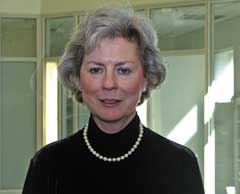For more archives, go to the Advance Archive/Search Page.
Athletic Advisory Committee Welcomes
Input from Community
Susan Spiggle hurries into her office. She has been caught up in a discussion regarding UConn’s athletics’ program during a breakfast meeting sponsored by the President’s Athletic Advisory Committee, and is running slightly late.
“There are some very interesting items that come up” during the morning meetings, says Spiggle, chair of the committee and host of that morning’s talks. “Today, there was a lively discussion about the role our athletic success has had in improving the institution. We’ve also talked about the status of athletic facilities, the impact of midweek football games on the players’ academic responsibilities, and the availability of tickets to athletic events. The issues are pretty wide-ranging, but so is the scope of PAAC.
“What I want to do as chair of PAAC is communicate, communicate, communicate,” says Spiggle, who also is an associate professor and head of the Department of Marketing in the School of Business. “It’s our role to provide President Austin with feedback regarding how the University’s academic mission is being carried out for our student-athletes, and to provide a pipeline to bring information back to athletics, especially the director, Jeff Hathaway.”
The roundtable discussions, which Spiggle now hosts about once a month during the academic year, have little to do with the win-loss record of UConn’s 23 varsity teams. The meetings focus on whatever topic the invited guests – generally an eclectic group of about a dozen faculty and staff – want to discuss. The process, she says, is more about information gathering and dissemination.
 |
Susan Spiggle, associate professor of martketing, is chair of the President's Athletic Advisory Committee |
Spiggle says athletic director Jeffrey Hathaway wants to communicate with the University community. “That’s his goal in working with PAAC,” she says. “If somebody sees a problem, he wants people to pick up the phone and call him. He’ll either realize it’s a rumor and put it to rest, or he’ll get to the bottom of the problem and, if necessary, correct it.,”
Hathaway attends all the meetings, as does Bruce Cohen, director of the Counseling Program for Intercollegiate Athletics (CPIA); Scott Brown, UConn’s NCAA faculty athletic representative; and Karla Fox, chair of PAAC’s faculty/staff relations committee.
The PAAC, which has existed for decades, used to have informational breakfasts, Spiggle says, but they had fallen by the wayside. Spiggle decided to “resurrect” them when she was named chair of the 29-member committee last year.
Hathaway appreciates the effort.
“The PAAC provides an essential role in the oversight of the University’s intercollegiate athletic program,” he says. “I believe the faculty and staff members of this committee are a key element of the communication process with the University community. We encourage that communication and welcome the committee’s interaction with the Division of Athletics.”
Spiggle hopes to increase that interaction during her term as chair, which runs through August 2005. Besides renewing the breakfast conversations with faculty and staff, and holding periodic meetings with Austin, Hathaway, and Brown, she has begun building a PAAC website that will include minutes of the committee’s meetings, a page for frequently asked questions, annual reports for the PAAC and all its subcommittees, and a list of committee members and their contact information. PAAC members will continue to meet about five times a year.
Since taking the reins of the group, Spiggle says she has had few calls from concerned members of the community.
“That’s maybe because the PAAC doesn’t have very high visibility, but it’s also because our athletic department does a very good job,” Spiggle says. “Jeff is very clear that his priorities are the academic success and graduation of student-athletes, the opportunity for our varsity athletes to compete at the highest levels, and preparing our student-athletes for life after UConn. He and his staff also emphasize, constantly, compliance with NCAA regulations. As good as we are, Jeff will tell PAAC members that any one incident could damage the University’s integrity. That’s just the way life is in the NCAA.”
Spiggle says compliance with NCAA regulations is a constant topic of discussion, during PAAC meetings and between coaches, Division of Athletics staff, and student-athletes.
“We avoid violations through constant documentation, ongoing efforts, communication, and education,” she says. “It involves constant attention and education.”
During the next year, Spiggle hopes also to communicate to faculty, staff, and students that she, the members of PAAC, and Hathaway are one phone call away, should anyone have a question regarding the Division of Athletics or UConn’s student-athletes.

